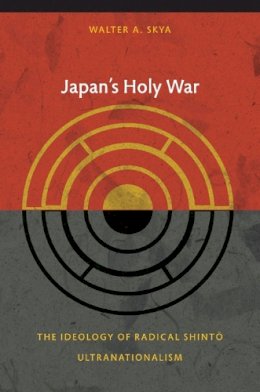
Japan´s Holy War: The Ideology of Radical Shinto Ultranationalism
Walter Skya
Skya documents a transformation in the ideology of State Shintō in the late nineteenth century and the early twentieth. He shows that within the religion, support for the German-inspired theory of constitutional monarchy that had underpinned the Meiji Constitution gave way to a theory of absolute monarchy advocated by the constitutional scholar Hozumi Yatsuka in the late 1890s. That, in turn, was superseded by a totalitarian ideology centered on the emperor: an ideology advanced by the political theorists Uesugi Shinkichi and Kakehi Katsuhiko in the 1910s and 1920s. Examining the connections between various forms of Shintō nationalism and the state, Skya demonstrates that where the Meiji oligarchs had constructed a quasi-religious, quasi-secular state, Hozumi Yatsuka desired a traditional theocratic state. Uesugi Shinkichi and Kakehi Katsuhiko went further, encouraging radical, militant forms of extreme religious nationalism. Skya suggests that the creeping democracy and secularization of Japan’s political order in the early twentieth century were the principal causes of the terrorism of the 1930s, which ultimately led to a holy war against Western civilization.
Product Details
About Walter Skya
Reviews for Japan´s Holy War: The Ideology of Radical Shinto Ultranationalism
Janice Matsumura
Canadian Journal of History
“The careful reader will come away with a very detailed overview of prewar Japanese fascism. The book is very detailed, very well written, and carefully researched. Japan’s Holy War is a classic work that should be on the reading list of any scholar of Japanese history who wishes to gain some deeper insights into the direction of Japanese politics from the late 1920s through World War II. A Japanese translation of this book should be made as soon as possible. Skyra is to be commended for this major academic achievement.”
Daniel A. Métraux
Virginia Review of Asian Studies
“The study may help illuminate some otherwise indecipherable currents of thinking that exist in Japan even today.”
Andrew J. Nathan
Foreign Affairs
“Walter Skya deserves praise for writing what is perhaps the only extensive study in English in decades that focuses on right-wing Shinto nationalism until 1945. . . . [T]his book is an important contribution to ongoing discussions on the significance of Shinto in modern Japan’s political arena.”
Fabio Rambelli
Journal of the American Academy of Religion
